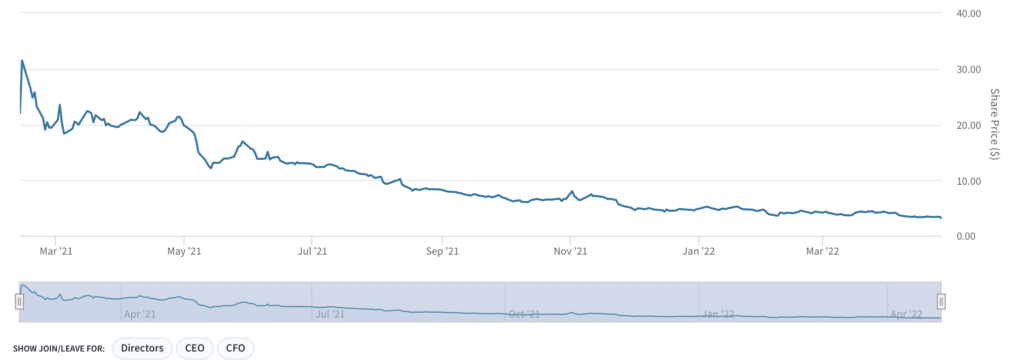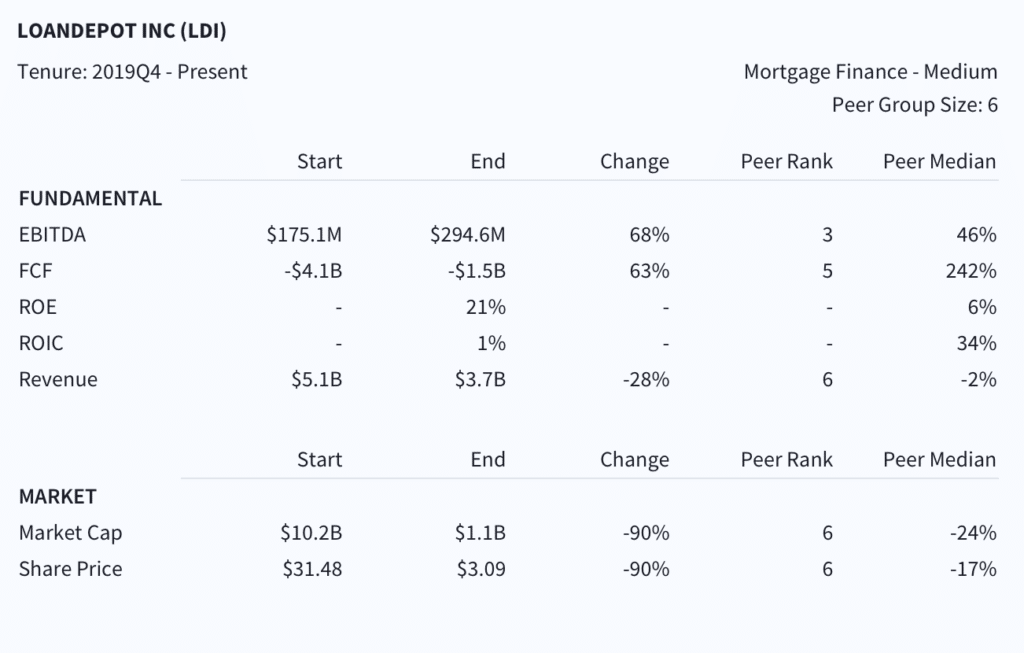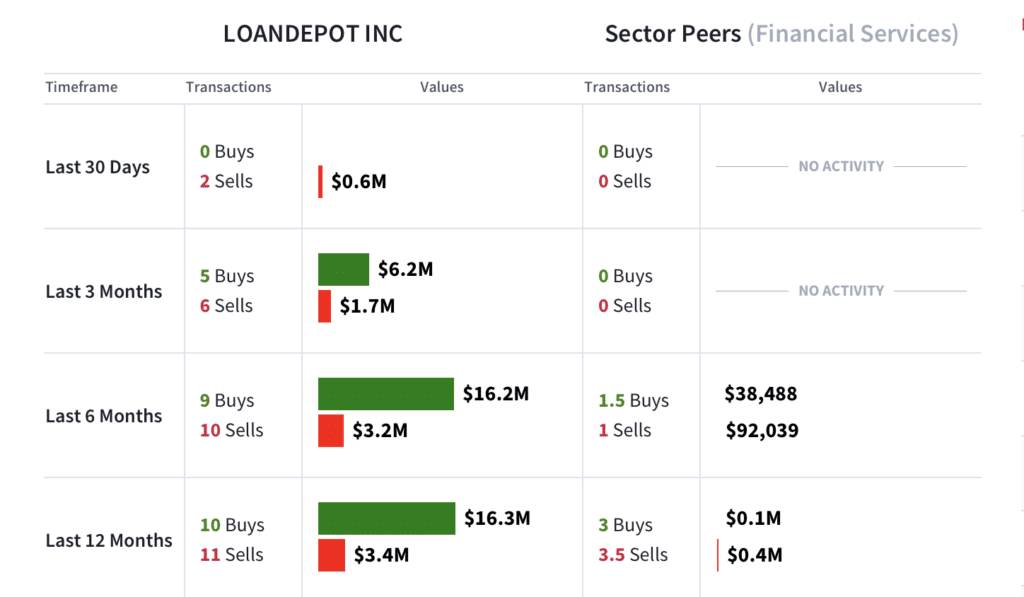Martell will need to figure out how to grow in a cooling, competitive market.
LoanDepot gets a new CEO. LoanDepot (LDI) appointed Frank Martell as president and CEO. Martell takes over from Anthony Hsieh, LoanDepot’s founder, who remains with the company as executive chairman. Hsieh is also LDI’s largest shareholder, with an 81.6% ownership stake.
More on Martell. Martell joins LDI from real estate analytics specialist CoreLogic, where he began as chief financial officer in 2011 and later became chief operating officer before being named CEO in March 2017 after the death of then-CEO Anand Nallathambi. Martell navigated CoreLogic through a hostile proxy battle which culminated in the company being taken private last June by Stone Point Capital and Insight Partners. Until October 2021, Martell also served on the board of directors of the Mortgage Bankers Association. Martell will also join LDI’s board of directors.
Second largest nonbank lender, behind RKT. LoanDepot was founded during the 2010 recession by Anthony Hsieh, who has served as the chairman and CEO for the past 12 years. Hsieh has a great track record, having created and sold two online lending companies: LoansDirect (acquired by e-Trade in 2001) and HomeLoanCenter (acquired in 2004 by LendingTree). In its early days, LoanDepot grew quickly with a strong mortgage origination offering and online distribution. The company’s mello platform uses machine learning to streamline the mortgage process for customers and capture refinancing opportunities. The company’ s strong brand and tech strategy has produced strong results: 72% of customers who got their first mortgage with the company also refinance their loans with LoanDepot– four times the industry average of 18%. LDI is the second-largest nonbank lender in the country, behind Rocket Companies (RKT)— employing ~10,000 people.
LDI stock: Downward slope since $14 IPO

Higher interest rates and margin erosion have hurt the stock. LDI went public in February 2021 in a difficult market. The company downsized its offering to $14 per share from an expected $19 to $21 range. Since the IPO, LDI shares have languished in a post-COVID environment. Loan demand is cooling, home sales and refinance volumes are declining, and mortgage rates are on the rise. While the company continues to gain market share, competition has squeezed margins. In particular, competition among wholesale lenders is expected to persist throughout 2022 and beyond. For 2022, consensus estimates call for a revenue decline of 36% YoY to $2.4B.
CFO scorecard: Since CFO Patrick Flanagan started LDI revenues have declined 28%

Fighting several lawsuits. Two class action lawsuits were filed last year alleging the lender of securities fraud, including claims that the company illegally cut corners and processed thousands of loans without required documents such as employment and income verification. In March, LoanDepot shareholder Tuyet Vu sued the company for allegedly misleading investors, claiming the firm’s leadership artificially inflated its stock at the time of its IPO.
Diversity & Inclusion Snapshot

Executive compensation is a concern. Executive compensation is well above the peer median. Former CEO Hsieh was and CFO Flanagan were paid $50.4M and $17.1M respectively in 2020.
Hsieh is buying. Hsieh continues to buy stock, having purchased $16.2M of stock since November 2021 and 93,500 shares (at an average price of $3.78) in February 2022. However, with the exception of Michael Linton (bought in August 2021) and Pamela Patenaude (bought in February 2022)– LDI’s directors have mostly sold stock.

LDI Insider trading activity: Mostly selling


Not a good time for a mortgage lender…but stock is priced for low expectations. In the near term, market volatility and the potential for interest rate increases are headwinds for LDI stock and the fintech sector in general. While we have reduced confidence in revenue and EPS this year, we think the risks are largely priced-in at 0.6x book value and 0.2x sales. RKI and United Wholesale Mortgage (UWMC) trade at 2.7x and 1.5x book, respectively.
New management could drive scale and efficiency improvements. We think LDI shares are worth a look here for patient long term investors. Martell has his work cut out for him. But, even in a slowing market, there is an opportunity for LDI to outgrow its competition, consolidate market share and drive scale and efficiency improvements. Market penetration is still very low (LDI had 3.4% market share in 2021), leaving ample room for LDI to capture a bigger piece of the pie.
Latest Podcast: Did Activision Blizzard’s Governance Failures Lead to a Quick, Cheap Sale to Microsoft, with Richard Clayton
Shareholders vote this Thursday on the $68.7 billion proposed acquisition of Activision Blizzard (ATVI) by software giant Microsoft (MSFT). Boardroom Alpha sat down with Richard Clayton, Director of Research at the Strategic Organizing Center (SOC) Investment Group. Founded in 2006, the SOC Investment Group works with pension funds sponsored by unions affiliated with the Strategic Organizing Center, a coalition of unions representing more than four million members. Clayton shares his take on Activision’s recent governance moves and why the proposed takeover by Microsoft isn’t in the best interest of shareholders. Listen to the podcast and read our overview here.
Want to see more interesting growth companies up-close, hear from industry leaders and learn about the ESG trends driving the markets? Check out our latest Boardroom Alpha podcasts here.
Get in Touch
Your comments and feedback are always welcome. Let’s continue the discussion. Email me at joanna@boardroomalpha.com.